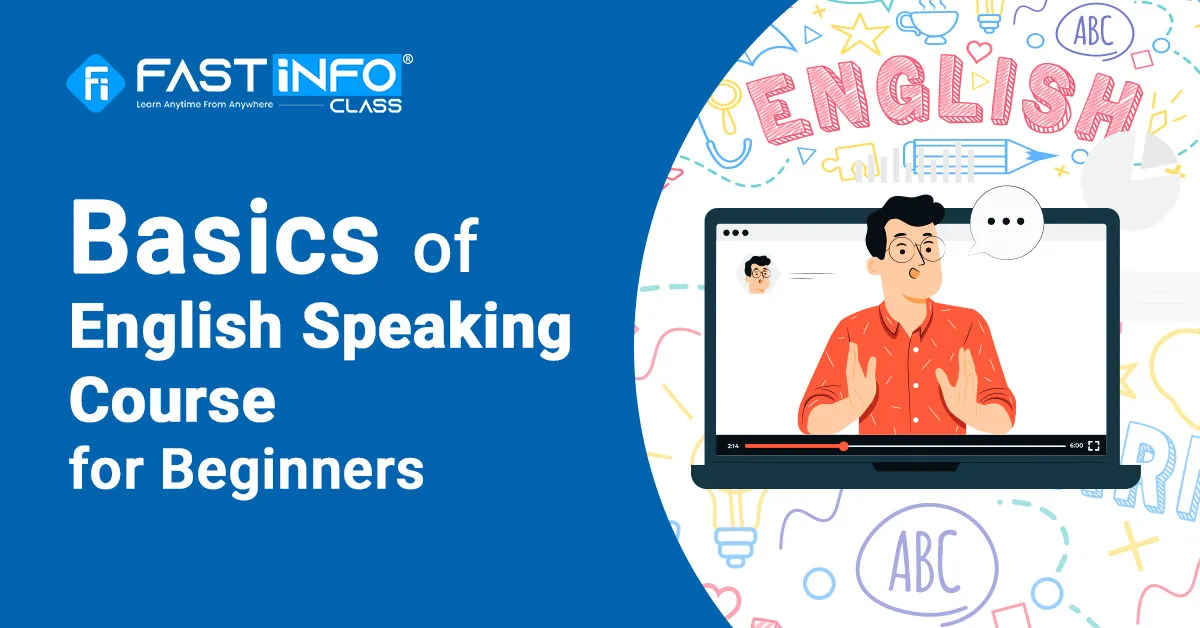Importance of Learning Spoken and Written English
26 Feb, 2025
.webp)
 By FastInfo Class
Published On 24 May 2022
Updated On 05 Feb 2025
Category Online Spoken English Class
By FastInfo Class
Published On 24 May 2022
Updated On 05 Feb 2025
Category Online Spoken English Class
It is common to face difficulty in vocabulary, grammar and pronunciation while learning a language. People are often afraid of making mistakes and are worried about sounding right while conversing in English. Using informal English at an improper time can be uncomfortable in the best-case situation. Using impolite English could affect your job or your grades in the worst-case situation. When you are learning English, it is necessary to learn that English has formal and informal uses. In the best online spoken English course, you can learn when to use polite English to circumvent embarrassing situations and you will get more success in academics and the workplace.
Join the best spoken English class, where you can learn polite English so you don’t make any mistakes that most people often do. You can refer to our FastInfo Class, which provides spoken English training online at affordable fees.
By using formal or polite English you can show respect to others. When you are at work, school, or meeting new people, always use formal English. This will ensure that you do not disrespect anyone. Then you will look more professional and respectful.
When you use informal English in a formal place it often sounds rude or arrogant. Instead, if you use polite English that will make you more likable and may get you more success in school, college, or at work.
It becomes more important for you to learn polite English when you are traveling to an English-speaking country as you don’t want to disrespect people during your travels. The best spoken English class will offer you the best spoken English training on how to be polite in English.
There are some common situations where you are required to use polite English. Here are six ways to use grammar to sound more polite and caring when speaking in English. These tricks taught in online English speaking classes will help you to exist in any English social situation.
We offer the best online spoken English course where you will get lots of examples that will help you practice.
You can convert your statement into a question instead of telling people to help you with the work. This will ensure the other person has the chance to say no. You will sound better and more considerate when you use questions instead of statements.
Even if you require immediate help, using questions will encourage the other person to help you. For example: Instead of saying, “Finish the presentation”, say- “Can you finish the presentation?” These rules must be followed correctly. If you want to learn these rules, get spoken English training from the best online spoken English course.
You can seem to be sounding impolite if you are too direct in your saying. In contrast, you can tell things in a manner that sounds more flexible. Do this by bringing flexibility to your language.
People will generally understand what you want to say even if you tell them in an indirect way. For example, Instead of saying directly, “Meet me at twelve o’ clock”, say- “Meet me around lunchtime”.
When you are talking with someone at school or workplace, it would be a good idea to explain things in detail. People will feel better if they know the things in detail if you are asking them to do something for you or explaining a problem.
To describe the things, you can use English words or phrases such as because, so, therefore or that’s why. For example, say- “The buyer is coming tomorrow, so I want you to finish the Presentation tomorrow by then”, instead of saying, “Finish this presentation by tomorrow”.
As it is already said above that using questions is more polite than using statements, however, you can make questions even more polite with the use of modal verbs.
In the formal speech, modal verbs like would, could, will, might, must, should, and shall are frequently used.
You can make any questions or statements sound more polite by using modal verbs if you are in any doubt. For example, say- “I would like the printer” instead of saying- “I want the printer”.
Another way you can be polite in English is to shift to the past tense. When you are including verbs like “want” or “need” in your sentences, it would be more polite to use past tense rather than present tense. For example, instead of saying “Do you want tea?”, say- “Did you want any more tea”?
When someone is doing any wrong thing in a professional setting, using passive voice in your sentence while telling that, becomes necessary. To avoid taking anyone’s name, using a passive voice in your speech is the best way. In this way, you will be more polite in English as you can address an issue without blaming anyone in particular.
You will not sound mean by this. For example, say- “I was given the wrong information” instead of saying- “Rohit provided me the wrong information”. Our experts in the best online spoken English course will teach you how to use passive voice in your sentence.
Using grammar tricks is a good option, but sometimes, you need to know about some common polite phrases too. As you study English from the best online spoken English course, you will come to read about more and more common phrases that must be used to be polite.
These are ideal for when problems emerge and you need to address the situation in a tactful manner. For example, it is better to say- “As I explained before…” instead of saying- “I already told you this”.
I hope this blog post will help you. You can reuse these phrases and expressions in different contexts. Start using them immediately to include them in your language. In the beginning, you might find it difficult to use. If you want spoken English training to learn these polite phrases and sentences you can join our FastInfo Class. It will help you to achieve this goal by providing you with the best online spoken English course.

Importance of Learning Spoken and Written English
26 Feb, 2025

Smart English Conversation Tips for Beginners
26 Feb, 2025

How to Learn English Fast: 10 Effective Tips
14 Feb, 2025

What is the Importance of English in Corporates?
13 Feb, 2025

How to Improve English Listening Skills: 12 Tips
13 Feb, 2025

Daily English Conversation Practice for Beginners: 50 Useful Topics
29 Jun, 2023

Must Read Novels to Improve English for Beginners to Advanced
21 Feb, 2023

Top 15 Spoken English Books to Enhance Your Fluency
09 Sep, 2023

English Speaking Course for Beginners - Everything you must know
22 Sep, 2021
.webp)
What are the Benefits of Speaking English Fluently?
27 May, 2021